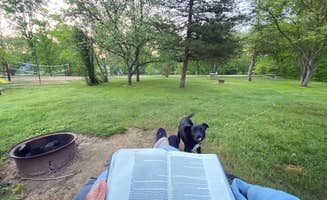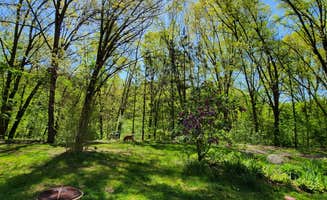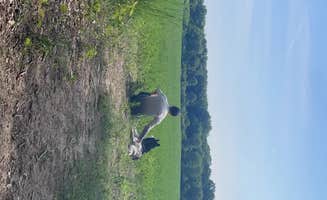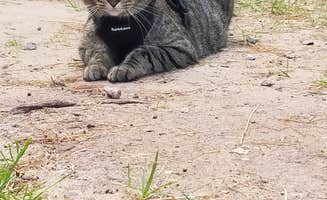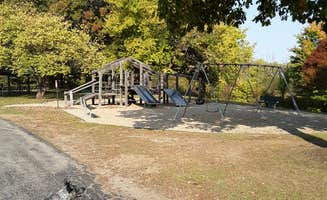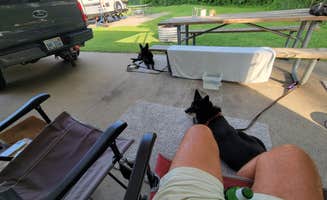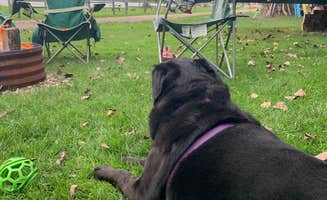Caledonia camping areas sit in southwestern Michigan between Grand Rapids and Kalamazoo, with typical summer highs reaching 80-85°F and moderate humidity. Most campgrounds in this region occupy relatively flat terrain between 800-900 feet elevation, with mixed deciduous forests and small lakes forming the backdrop for outdoor recreation opportunities. Winter camping remains limited with only a few facilities offering year-round access.
What to do
Hiking trails near Deep Lake: Short drives from Caledonia campgrounds lead to numerous hiking options within Yankee Springs Recreation Area. "There's a beautiful lake to fish and kayak. Tons of hiking trails!!" notes Jessica R. about Deep Lake Rustic Campground.
Golfing opportunities: Tyler Creek offers an unusual combination of camping and golf. "Offers golf. Wish they didnt sell out half of the 18 hole course. Has a swimming pool and camp store. Close to the Boulder Ridge Zoo," explains Jami M. about Tyler Creek.
Fishing from docks: Several area lakes provide fishing opportunities without needing a boat. Dale B. mentions that Deep Lake "has a fishing dock and a boat landing but no beach," while another reviewer notes the pond at Hidden Ridge is good for "cat and release fishing."
Water recreation: Paddling opportunities exist throughout the region with multiple lake access points. One camper at Welcome Woods Family Campground shared their experience: "They also have a dock you can rent space and keep your boat in the lake. Great fishing."
What campers like
Indoor swimming options: Beyond seasonal outdoor pools, Indian Valley offers year-round swimming. "The indoor pool was great for the preseason camping! Being there in early May, when it was rainy we were happy to have that amenity," reports Nicole C. about Indian Valley Campground & Canoe Livery.
Family-oriented activities: Many campgrounds specifically cater to families with children. Melissa L. shares about Tyler Creek: "Bathrooms, crafts shed and such are a little run down but again optimistic that this new family will do great things. Weekend golf cart rentals for 90 bucks which is a steal!"
Clean facilities: Campers frequently note cleanliness as a priority. Dan W. observed at Sharp Park Campground: "Bathrooms and shower was spotless. Sites not along the lake did have a bit more room and shade."
Rental opportunities: Many campgrounds offer equipment rentals to enhance camping experiences. Teresa V. notes that Sharp Park "offers canoe, kayak, fishing boat, and paddleboat rentals as well as fishing pole rentals with night crawlers available for purchase in the store."
What you should know
Site variability: Campsite quality can vary significantly within the same campground. Ryan F. warns about Deep Lake: "This campground offered the worst of both worlds. No creature comforts and absolutely no privacy or connection to nature. It felt like camping in a parking lot!"
Weekend crowds: Popular campgrounds fill quickly, especially during summer weekends. At Woodchip Campground, reviewers note that the campground is "totally full" on weekends and "spots are small."
Road conditions: Some campgrounds have challenging internal road systems. One camper mentions: "The roads are plowed up and no more playground the beach is salty at best not a good place to bring kids."
Weather considerations: Michigan weather can impact camping experiences significantly. Jacob K. advises about Gun Lake Campground: "Be careful what campsite you get though because flooding was a problem last time I was there. We got 2-4" of rain overnight."
Tips for camping with families
Look for campgrounds with kids' activities: Several dog-friendly campgrounds near Caledonia feature activities specifically for children. "We love this as an easy getaway close to home. I wouldn't call it a beautiful campground... but it is clean, and has a ton to do for kids!" shares Andrea B. about Woodchip Campground.
Consider campground layout: Some campgrounds design layouts with families in mind. Andrea continues: "There are campsites in a circle around the playground, so you can sit at your site and watch the kids play."
Ask about special events: Seasonal events can enhance family camping trips. Cassondra P. notes about Hungry Horse Campground: "We came here for a fall camping weekend. Kids loved going on wagon ride to find the pumpkins and then decorating them. They really enjoyed the glow wagon ride."
Check proximity to bathrooms: For families with young children, bathroom location matters. Some reviewers note that certain campgrounds require long walks to reach bathroom facilities, while others have conveniences nearby.
Tips from RVers
Site size considerations: RV campers should verify site dimensions before booking. Beth H. notes about Hidden Ridge RV Resort: "This park is very big. Seems to have a lot of seasonal campers there but still spots for the vacationers too."
Pad types vary: Some campgrounds offer premium pads for RVs. Julie T. observes: "Spacing was generous between locations. We had a drive-in(forward) location(#10) overlooking the small lake."
Hookup availability: Full hookups aren't universal at all campgrounds. While Hidden Ridge offers full hookups, others like Gun Lake Campground have electric but no sewer or direct water connections.
Dump station access: Plan for dump station timing. One reviewer notes: "We were in line for about an hour before we dumped and we pulled off our site at 1."


